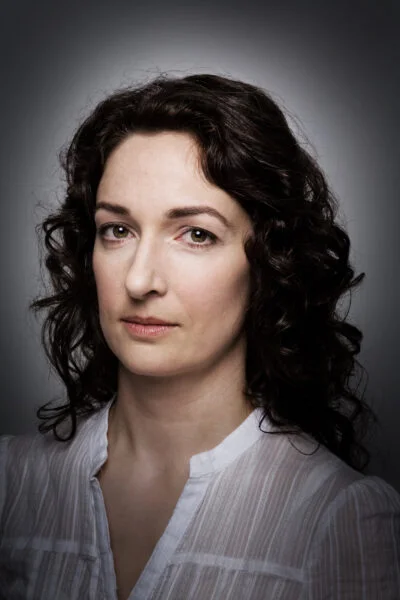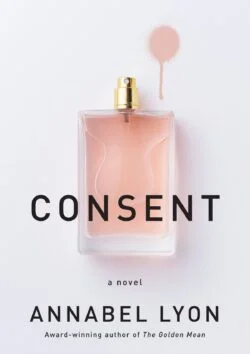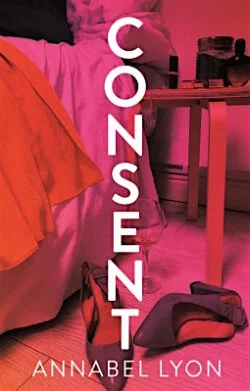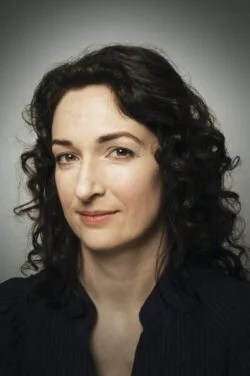#975 Stable women and good wine
Consent
by Annabel Lyon
Toronto: Penguin Random House, 2020
$29.95 / 9780345811455
Reviewed by Jessica Poon
*
Editor’s note: The West Coast Book Prize Society announced on April 8, 2021, that Consent, by Annabel Lyon, has been shortlisted for the Ethel Wilson Fiction Prize in the 2021 BC and Yukon Book Prizes. Winners will be announced on Saturday, September 18th, 2021 — Richard Mackie
*
 Like a vampire chugging type-O blood in an unblinking, insatiable fervour, I finished Consent by Annabel Lyon in one sitting. What better endorsement than to confess that I brought Consent with me to the bathroom? Simply put, I did not want to stop reading. It’s juicy and profound, a winning combination.
Like a vampire chugging type-O blood in an unblinking, insatiable fervour, I finished Consent by Annabel Lyon in one sitting. What better endorsement than to confess that I brought Consent with me to the bathroom? Simply put, I did not want to stop reading. It’s juicy and profound, a winning combination.
My first impression of the pink cover with the upside down glass with a lipstick stain and enclosed spider, with an artillery-loaded title like Consent, was not dissimilar from my first impression of Curtis Sittenfeld’s Prep, with a green and pink boarding school belt: I thought, are the publishers trying to alienate heteronormative male arachnophobes? It’s not difficult to imagine a heteronormative man glancing dismissively at the cover, erroneously assuming it is a topical, inherently “girly” book (and therefore, unworthy) capitalizing on the #MeToo phenomenon for all its literary worth.
I am here to tell any heteronormative men that Consent is not that book. Consent reads like a psychological thriller that is simultaneously predictable and surprising in the right dosages. The myriad meanings of Lyon’s aptly titled book are brought to question multiple times; it could just as easily be titled Power (but this would have markedly less panache). Lyon presents us not with a crudely binary version of consent involving a rapist jumping out of the woods on a Lolita — there is zero “No means no” politicking in these pages — but a more nuanced, thoughtful one that would prove propitious for book club discussions.

As Consent is set in Vancouver, Lyon is careful to simulate the multicultural city with the character of David Park, an intermittent love interest — nearly always referred to by his full name, as is another evocatively named character, Donna August — and nearly all the medical staff present have Asian surnames; however, Consent is primarily dominated by two sets of presumably white, financially comfortable sisters: Saskia and Jenny, Sara and Mattie. Saskia and Jenny, whose similar appearances bely their conveniently opposite personalities — Saskia is serious, a graduate student in existentialist French literature who, at times, sounds more nihilistically purposeless than anything else, whereas Jenny is more of a reckless bon vivant with flamboyant clothing and casual promiscuity. It might be clichéd, but it’s sufficiently authentic. Even as young children, Saskia’s seriousness and the sisters’ overall differences are so stark that impersonating each other does not fool their mother. Meanwhile, Sara is a Francophile with an appetite for couture, the very epitome of aspirational materialism and culture welded together, whereas Mattie is sweet, dependent on their mother, and intellectually disabled.

With a prohibitively expensive dress procured only after a number of tyrannical sartorial trials from a refreshingly ugly woman (“The first time Sara saw her, she assumed the woman was homeless” [p. 11]) referred to as “the queen,” Sara’s acquisition is worn publicly not by Sara, but by Mattie. Although on a literal, physical basis the dress reveals far more of Mattie than it does of Sara, it becomes apparent that Sara’s motives can be inexplicably cruel. It will not be the first time Sara obtains or overrides Mattie’s consent with her greater intellectual capacity and concomitant cruelty.
After Jenny’s hospitalization, Saskia’s life becomes more colourful, even a neutered facsimile of her sister’s. She dates Joel, an ideal boyfriend, if not particularly interesting, and experiments with Jenny’s clothing. One gets the impression that clothing makes the woman or, failing that, has an outsized impact on a woman’s life — certainly true enough. When Saskia is mistaken for Jenny in a clothing store, albeit on an “off” fashion day, I was reminded of Pretty Things by Virginie Despentes, whereupon Pauline’s long-time imprisoned boyfriend, mistakes Pauline — having recently made an effort with her appearance — for her more conventionally gorgeous twin sister, Claudine (Despentes is not subtle). Instead of correcting this case of mistaken identity, Pauline realizes her boyfriend has been unfaithful numerous times with her now late twin sister. Though less drastically and far less salaciously than Despentes, Lyon presents a similar idea: why correct a case of mistaken identity, after all, if the mistake is flattering and the truth is too fraught to explain? The problem with tragedy, tragedy notwithstanding, is the uncomfortable consequence of good things happening directly as a result, which Lyon writes about well.

Arguably, Robert Dwyer is the most compelling character on the page in Consent. Every time he appeared in the book, I found myself apprehensive and excited. When Sara finds out Mattie is married to their late mother’s handyman, Sara assumes the most sinister intentions on Dwyer’s part — is she right to interfere with her sister’s life? Is Dwyer being plainly unethical, or is he Machiavellian and kind? Can such seemingly contradictory qualities co-exist if financial security is a motive? Does the motive taint everything? What consequences will be meted as a result of such dictatorial, if well-intentioned consent-usurping power on Sara’s part?
Sara is not a traditionally likeable character, nor does she have to be; if anything, it made me like her more. Her lifelong forays into fashion make for some of the more delicious writing in the book; one almost wishes there were more of it. She is disgusted with her mother’s racial prejudices, as evidenced in this passage: “ . . . David Park would stay for supper. Sara’s mother tried Chinese recipes on him — chicken with peeled almonds, strange yellow curries — that she’d never made before and never would again. … Her mother also spoke to him too loudly and slowly, and would always bleach the bathroom after he’d left for the evening” (p. 9). This passage is a scene from 1992 and unfortunately, is probably a creditable representation of how the influx of East Asians was perceived.

In any case, while anti-Asian racism may have temporarily receded behind comforting model minority beliefs, as of this writing, anti-Asian sentiments are globally rising on a level that suggests, perhaps, Asians were never really accepted, let alone welcomed. Conflating all East Asians as Chinese continues to be a widespread, unchecked assumption that adds to the realism of Sara’s mother’s racism. Having said that, Sara’s mother’s racism is, in some ways, strangely benign, doubtless due to the widespread narrative of Asian men being untraditionally masculine, i.e., not masculine, as exemplified by this passage: “You need to see him at least once. To thank him for all the time he’s spent with Mattie. Those people are very particular about observing the courtesies.” Sara did not say which people?” (p. 16). Sara’s mother exhibits not merely tolerance, but a fond, almost admiring tolerance for David’s apparent chivalry, which makes for ambivalent territory and novelistic gold. Her racism is not a monolithic caricature, but sedimentally layered.
On the other hand, Sara is perhaps too self-satisfied with her own relative awareness: “David was the child of immigrants who spoke Korean at home and relied on him to be their link into the new world. He suffered the classic schisms Sara had read of in novels: the conflicting loyalties, the alienation, the guilt” (p. 9). To read of injustice is not to experience it, and yet, reading is often one of the most touted quasi-solutions to racism. In other words, Sara’s self-conception as a worldly, non-racist person in contrast to her mother’s racism, is entirely believable.
In a conversation with Claes deWinter, a Dutchman, Sara points out that his English is “excellent” (p. 157). It’s a bit of an odd remark, considering Sara is glamorously well-travelled and statistically speaking, the Dutch speak some of the best English in the world, overtaking even Sweden. When Claes deWinter grandiosely says,
“I hear things on a different plane from most people. A higher plane I will say, yes? I am a sad old slouching divorced Dutchman, but I have this one gift that no one can take from me. I can reach one finger out of this world and into the next, which is more than most people. That gift makes my life meaningful.”
“No, it doesn’t,” Sara said very softly, but he didn’t hear her . . . ” (p. 159)
Sara, a connoisseur of the good and often material things in life, reveals herself to be a contrarian nihilist, quietly espousing her belief that life is inherently meaningless and cannot be made meaningful through art. And yet, her seemingly magnetic attraction to obtaining beauty, whether in the form of clothes or perfume, bears motivational similarity to deWinter’s purported gift for creating meaningful music. This passage is telling.

A deceased character’s cell phone becomes an excellent, modern allegory for consent that cannot truly be given. I found myself legitimately chilled and disgusted by the inference of the cell phone owner’s privacy being breached. As an English major, I found myself wanting more references to French literature — jokingly referred to as “pornography” after Saskia switches advisers — than there were. I assumed that a “purple-streaked receptionist” (p. 51) was white and that the “blonde Japanese stylist” (p. 52) was demonstrably not. The outrageous real estate market in Vancouver is summarized neatly and accurately in one sentence: “That was Vancouver for you” (p. 186). Resorting to a place as an adjective comes with the risks of cutesy, overfamiliar shorthand, but Lyon’s use of “Vancouver,” with regard to real estate prices, is justified. At one point, Saskia settles in Yaletown, a notoriously upmarket neighbourhood, formerly the home of many warehouses.

Consent never pretends to truly concern anyone besides financially stable women and an especially wayward, fascinating blue-collar man in the form of Dwyer; however, that is also partly why it provides such thrilling escapism (“They stood in Hermès, arguing” [p. 168]) and enjoyably vicarious hedonism (e.g. Sara bringing an intentionally empty suitcase to France, in anticipation of shopping — the envy I felt). In any case, David Park indicts Sara with a speech so cuttingly on the nose that I wondered if it was written as a protective measure against any reader thinking the same thing: “You and your family are the most privileged, entitled people I’ve ever known. You have money and education and power, you travel, what you spend on clothes could put a kid through college. Selfishness, all selfishness” (p. 119). Although he becomes a surgeon and remains an amateur violinist, David Park is, mercifully, not a totally one-dimensional model minority supporting character. He is given the capacity to be a fundamentally flawed human being entirely capable of exhibiting a martyr’s unkind judgement. As David Chang astutely writes in his memoir, Eat a Peach, “Rich kids are always the most fucked up.” At least in Consent, that seems to be the prevailing order of things and it makes for a wicked read.
I cannot, under the traditional rubric ending with a wedding or a funeral, classify Consent as either a comedy or a tragedy; it is, to an extent, both. There is a picnic, and I’ll leave it at that. The ending will likely not be a universal crowd-pleaser, but I found myself appreciating this readerly equivalent of a wink, that, in its own way, seemed to nudge me towards buying more expensive wine in the future.
*

Jessica Poon is a writer, line cook, and pianist in Vancouver. She recently completed her bachelor’s degree in English literature at the University of British Columbia. Visit her website here. Editor’s note: Jessica Poon has also reviewed books by Monika Hibbs, Grant Hayter-Menzies, and Wayson Choy for The Ormsby Review.
*
The Ormsby Review. More Books. More Reviews. More Often.
Publisher and Editor: Richard Mackie
The Ormsby Review is a journal service for in-depth coverage of B.C. books and authors. The Advisory Board consists of Jean Barman, Robin Fisher, Cole Harris, Wade Davis, Hugh Johnston, Patricia Roy, David Stouck, and Graeme Wynn. Scholarly Patron: SFU Graduate Liberal Studies. Honorary Patron: Yosef Wosk. Provincial Government Patron since September 2018: Creative BC
“Only connect.” – E.M. Forster